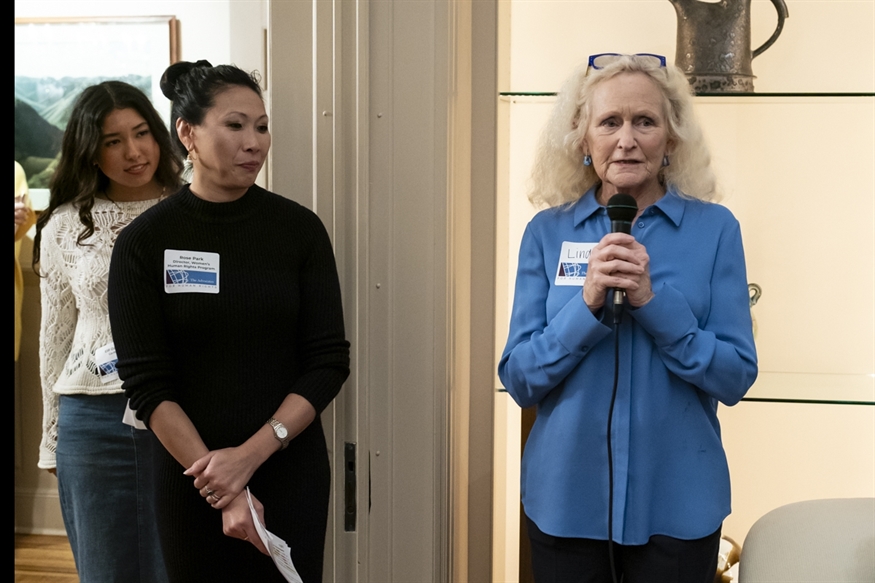Safeguarding Our Space, Our Gains, and Women’s Rights as Human Rights

Remarks by Rosalyn Park, Women's Human Rights Program Director, at our October 26, 2023 women's fall house party
Thank
you to our hosts, Linda Foreman and Mel Dickstein, for welcoming us
into your home to celebrate our work to uphold women's human rights.
As we near the end of 2023, we can look back on a long road of landmarks in the history of women's rights.
· In 1920, women secured the right to vote in the U.S.
· In 1963, the Equal Pay Act passed.
· In 1979, CEDAW, the women's rights treaty, was adopted.
· And in 1995, 30,000 women convened in Beijing for a groundbreaking conference where women's rights were truly recognized as human rights.
But
when we look around our country and the world today, we are worried.
Sexual and reproductive rights here and elsewhere have regressed,
sending us back 50 years. Women across Europe have reported losing
custody of their children in domestic violence cases. Governments are
cracking down on human rights defenders and making it so dangerous for
them to work that they have no choice but to flee. The far-right
movement has made tremendous gains in broadening their membership and
spreading messages of hate. Their latest campaign is called "The Not
Campaign" and is designed to oppose same-sex marriage, reproductive
rights, and trans rights using messages like "Not a Marriage," "Not a
Choice," and "Not a Woman." In the face of such relentless attacks,
things can feel hopeless.
And that's where The Advocates comes in - we are taking on these challenges head on and will uphold our rights. Let me tell you how.
And that's where The Advocates comes in - we are taking on these challenges head on and will uphold our rights.
First, we're going to be fearless. Here in Minnesota, we've been part of the statewide effort to respond to sex trafficking and ensure that victims are identified and receive services. Being fearless means pushing the boundaries on what we can do. And for us, that means expanding our work to stop sexual exploitation before it happens. With our latest work, we are looking at the drivers that make people vulnerable to sex trafficking in the first place: poverty, homelessness, abuse, marginalization, racism, and lack of access to health care. We'll be working with the community to develop a statewide blueprint to implement our recommendations and stop people from becoming victims in the first place.
Second, we are going to slingshot everything we know to build a robust response with our partners to combat the far right. This means taking all the great strategies we've learned from our partners and sharing them out so everyone can benefit. I can't tell you how many times I've heard a human rights partner say, "I wish I'd known about that strategy-we would have done it in our own country." We will bridge those connections and reinforce our partners, so they don't have to do it all by themselves.
Third, we're going to engage everyone. Our partners, our volunteers, and our supporters. It's going to take all of us to reclaim our rights. I'll end with one story that, when I'm feeling blue, lights a fire under me, because it reminds me that we are working alongside the most courageous individuals I have ever met.
"Elena"
is a lawyer in Russia, where she takes the hardest cases of violence
against women. But conditions in Russia are very difficult for
any activist. If the government decides to target you, it becomes so
dangerous to work that most people must flee the country.
I talked to "Elena" a few weeks ago, and she told me she heard she was next to be targeted. I asked her what she would do. I'll never forget her response. She said, "We are not going to stop our work. Not on my watch. We will rebuild everything on new tracks." "Elena" may need to fly under the radar on certain things because of the risk, but that is where we can come in as partners, leverage our volunteers to do the work, and take the heat ourselves. We've been doing just that with our reports criticizing Russia's human rights record.
The
Beijing conference was 30 years ago. It was a galvanizing event. But
its purpose continues to be important today. We must continue
safeguarding our space, our gains, and cementing women's rights as human
rights-not just us who remember the conference, but the next generation
who will carry the torch forward.
Missed the house party but inspired to support our work? You can still donate here and help us meet our $25,000 match!



